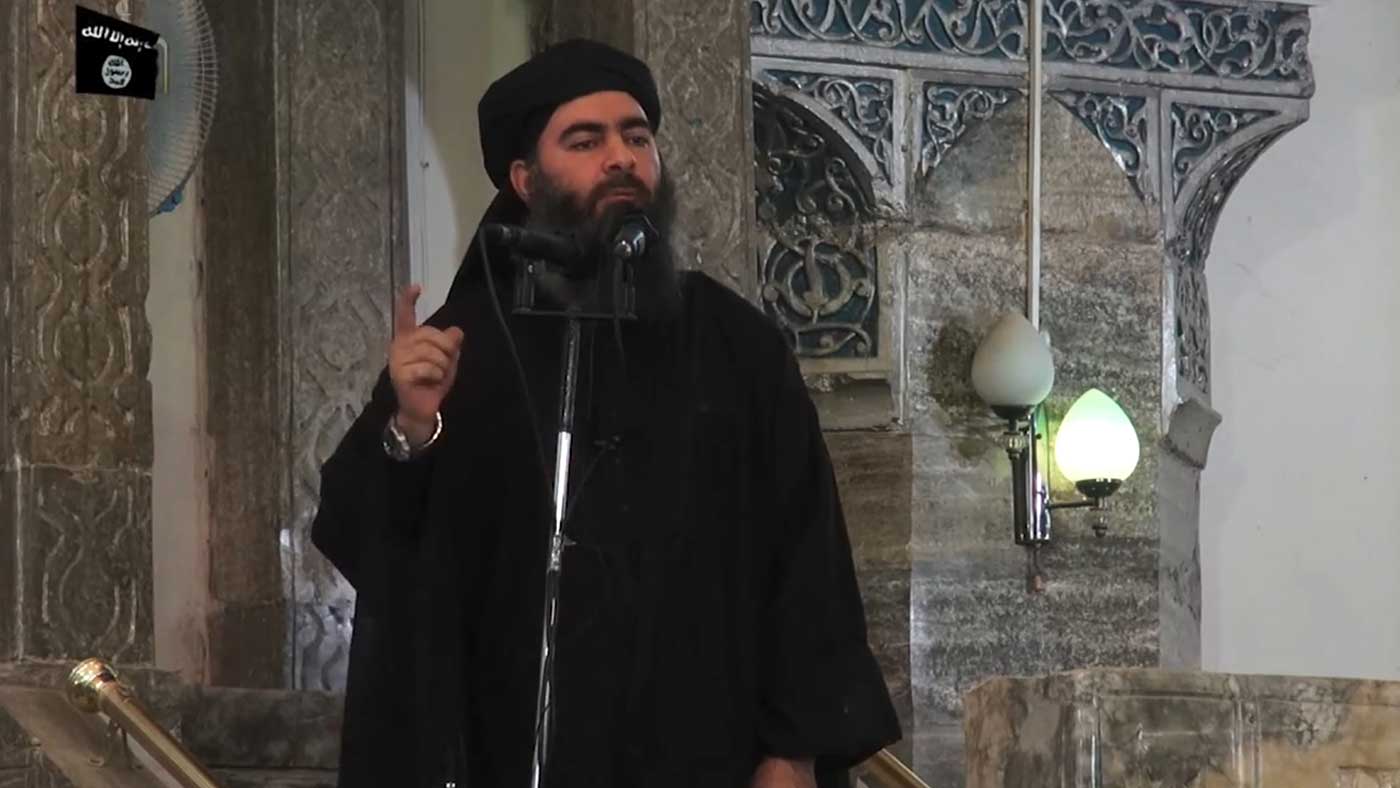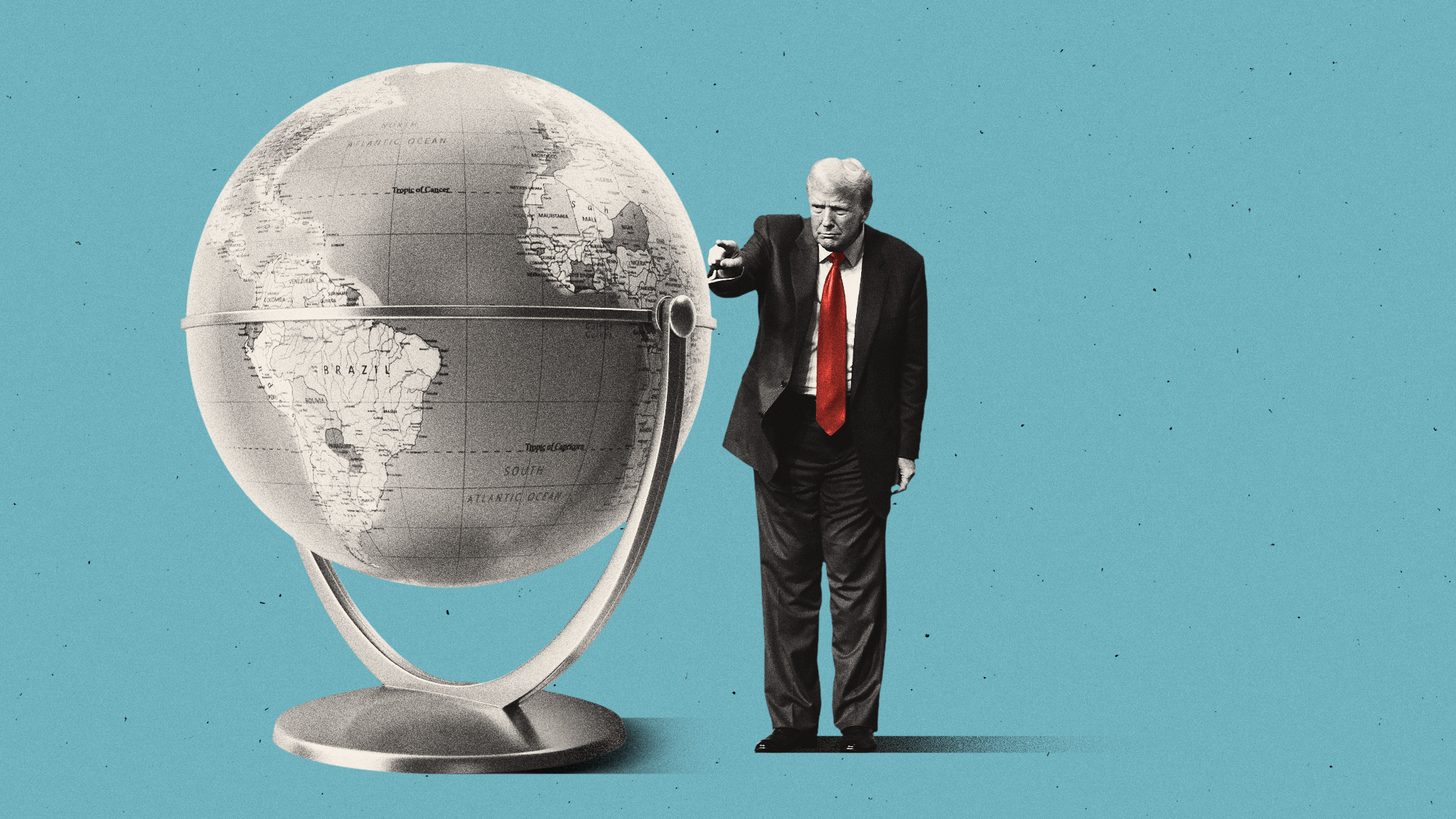The consequences of killing Abu Bakr al-Baghdadi
What the death of the Islamic State leader means for the terror group, the region and Donald Trump

A free daily email with the biggest news stories of the day – and the best features from TheWeek.com
You are now subscribed
Your newsletter sign-up was successful
US military intelligence officials are sifting through documents discovered at the compound of Islamic State leader Abu Bakr al-Baghdadi, who was killed following a US raid in north west Syria on Saturday.
Baghdadi - known by his adopted nom de guerre rather than his real name - had been the leader of Islamic State (IS) since declaring the birth of the so-called Caliphate during a sermon at the al-Nuri mosque in Mosul in 2014. At its peak, it covered vast swathes of Iraq and Syria and ruled over seven million people. It also attracted fighters from all over the world, including hundreds from Britain.
Over the past five years Baghdadi had remained in hiding, rarely releasing videos and becoming one of the world’s most hunted individuals, with a $25m (£20m) US bounty on his head.
The Week
Escape your echo chamber. Get the facts behind the news, plus analysis from multiple perspectives.

Sign up for The Week's Free Newsletters
From our morning news briefing to a weekly Good News Newsletter, get the best of The Week delivered directly to your inbox.
From our morning news briefing to a weekly Good News Newsletter, get the best of The Week delivered directly to your inbox.
His death has been widely mis-reported on several occasions, although he was believed to have been paralysed in a coalition airstrike in May 2017.
How did he die?
Baghdadi is believed to have blown himself up with a suicide vest as US special operations forces descended on a compound where he was sheltering with his family in the Idlib province near the Turkish border. Both his wives are also thought to have been killed, while no US casualties have been reported.
Turkey's official news agency Anadolu reports that eight US helicopters and two drones participated in the month-long intelligence operation that had tracked Baghdadi to the region through a smuggler who had moved the wives of two of his brothers from Iraq to Idlib.
A free daily email with the biggest news stories of the day – and the best features from TheWeek.com
Intelligence was recovered by US special forces soldiers before the compound was hit by an air strike to prevent the building from becoming a shrine to the terror leader.
Experts had speculated that Baghdadi was hiding out with a small number of supporters in western Iraq or in the vast Badia desert around Homs, central Syria.
“His presence in Idlib, the last-remaining anti-Assad opposition stronghold, will come as a surprise to some as the province is under the control of rebel groups hostile to IS,” says The Daily Telegraph.
Sources told the paper that members of Hayat Tahrir al-Sham, the Islamist rebel group aligned with al-Qaeda and in control of much of the province, had also been looking for him.
What will it mean for Islamic State?
Following the fall of Mosul and Raqqa in 2017, and the subsequent loss of Baghuz, IS’s last urban stronghold in March this year, “Baghdadi became a fugitive leader, ruling the terror group largely in isolation”, says The Times.
It was reported in August that he was handing over the day-to-day running of the terror group to Abdullah Qardash, a former officer in Sadam Hussein’s army.
However, “if confirmed, the death would be a devastating blow to a terror group that had run rampant across the region for five years from mid-2014, spawning gruesome terror attacks across the world, amplifying a mass refugee exodus and sparking a war to contain them that killed thousands of people and displaced millions more”, The Guardian reports.
“Throughout that time, Baghdadi remained the face of IS: a fearsome implacable ideologue who eluded the world’s intelligence agencies while continuing to incite a war of civilisations,” says the paper.
–––––––––––––––––––––––––––––––For a round-up of the most important stories from around the world - and a concise, refreshing and balanced take on the week’s news agenda - try The Week magazine. Get your first six issues for £6–––––––––––––––––––––––––––––––
Baghdadi’s possible elimination “is a blow to IS, yet not a fatal one”, says CNN’s Ben Wedeman. Despite claiming to be descended from the Prophet Mohammed, Wedeman says he “never had a cult of personality, [with] diehards, the ones who still remained loyal to the ideology of IS, stressing their allegiance to ad-Dawla al-Islamiya - the Islamic State, not to its leader”.
The New York Times says Baghdadi’s death “would be another important victory in the campaign against the Islamic State, but counterterrorism experts warned that the organisation could still be a potent threat”.
IS still operates in West Africa, Libya, Egypt’s Sinai Peninsula, Afghanistan and the Philippines, and has followers in Europe and elsewhere. Despite losing its last significant territory, the group is believed to have sleeper cells around the world as part of its new strategy “to carry on fighting a ‘war of attrition’ against its enemies”, reports BBC security correspondent Frank Gardner.
As well as foreign-based fighters, a report issued by the Pentagon’s Inspector General in August estimates it still has between 14,000 and 18,000 fighters in Syria and Iraq.
Moreover, says The New York Times, “Baghdadi was no Osama bin Laden in the American psyche and hardly a household name in the United States, which may limit the psychological and political impact at home”.
Will it boost Donald Trump?
For Trump, “a successful operation could prove both a strategic victory in the battle against the Islamic State and a politically useful counterpoint to critics in both parties who have assailed him in recent weeks for withdrawing American troops from northern Syria, which allowed Turkey to attack and push out America’s Kurdish allies”, says The New York Times.
Earlier this month, a CNN poll found that three-quarters of Americans are concerned about the situation in Syria.
Reuters reports that “many critics of Trump’s Syria pull-out have expressed worries it would lead the Islamic State militancy to regain strength and pose a threat to US Interests”, and an announcement about Baghdadi’s death “could help blunt those concerns”.
Seeking to emulate the poll boost Barak Obama received after the killing of Osama bin Laden in 2011, the White House released a picture of Trump in the situation room apparently watching the operation unfold.
Trump described the operation against Baghdadi as “the top national security priority of my administration”.
He may even claim credit for helping to lure the IS leader into the open. “US officials had feared that IS would seek to capitalise on the upheaval in Syria,” says Reuters. “But they also saw a potential opportunity, in which IS leaders might break from more secretive routines to communicate with operatives, potentially creating a chance for the US and its allies to detect them.”
Elliott Goat is a freelance writer at The Week Digital. A winner of The Independent's Wyn Harness Award, he has been a journalist for over a decade with a focus on human rights, disinformation and elections. He is co-founder and director of Brussels-based investigative NGO Unhack Democracy, which works to support electoral integrity across Europe. A Winston Churchill Memorial Trust Fellow focusing on unions and the Future of Work, Elliott is a founding member of the RSA's Good Work Guild and a contributor to the International State Crime Initiative, an interdisciplinary forum for research, reportage and training on state violence and corruption.
-
 The Olympic timekeepers keeping the Games on track
The Olympic timekeepers keeping the Games on trackUnder the Radar Swiss watchmaking giant Omega has been at the finish line of every Olympic Games for nearly 100 years
-
 Will increasing tensions with Iran boil over into war?
Will increasing tensions with Iran boil over into war?Today’s Big Question President Donald Trump has recently been threatening the country
-
 Corruption: The spy sheikh and the president
Corruption: The spy sheikh and the presidentFeature Trump is at the center of another scandal
-
 Munich Security Conference: a showdown between Europe and Trump?
Munich Security Conference: a showdown between Europe and Trump?Today’s Big Question Report suggests European leaders believe they can no longer rely on the US for military support – but decoupling is easier said than done
-
 New START: the final US-Russia nuclear treaty about to expire
New START: the final US-Russia nuclear treaty about to expireThe Explainer The last agreement between Washington and Moscow expires within weeks
-
 Would Europe defend Greenland from US aggression?
Would Europe defend Greenland from US aggression?Today’s Big Question ‘Mildness’ of EU pushback against Trump provocation ‘illustrates the bind Europe finds itself in’
-
 Greenland, Colombia, Cuba: where is Donald Trump eyeing up next?
Greenland, Colombia, Cuba: where is Donald Trump eyeing up next?Today's Big Question Ousting Venezuela’s leader could embolden the US administration to exert its dominance elsewhere
-
 Did Trump just end the US-Europe alliance?
Did Trump just end the US-Europe alliance?Today's Big Question New US national security policy drops ‘grenade’ on Europe and should serve as ‘the mother of all wake-up calls’
-
 Trump peace deal: an offer Zelenskyy can’t refuse?
Trump peace deal: an offer Zelenskyy can’t refuse?Today’s Big Question ‘Unpalatable’ US plan may strengthen embattled Ukrainian president at home
-
 Vladimir Putin’s ‘nuclear tsunami’ missile
Vladimir Putin’s ‘nuclear tsunami’ missileThe Explainer Russian president has boasted that there is no way to intercept the new weapon
-
 Russia’s war games and the threat to Nato
Russia’s war games and the threat to NatoIn depth Incursion into Poland and Zapad 2025 exercises seen as a test for Europe